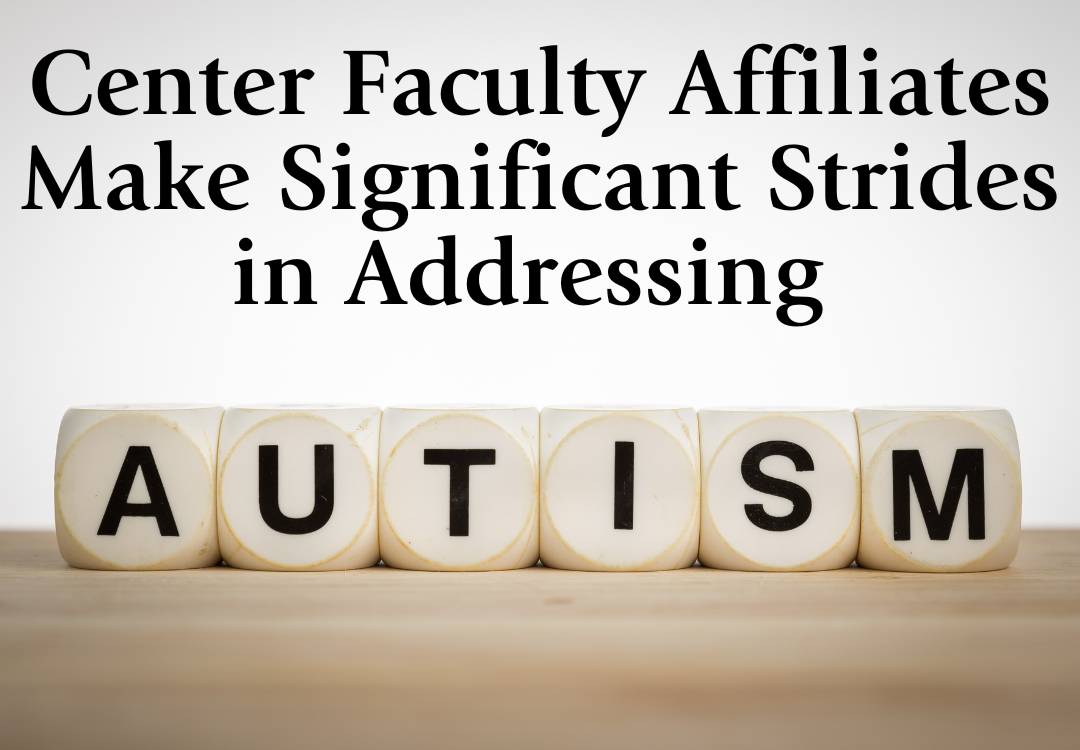Center Faculty Affiliates Make Significant Strides in Addressing Autism

In celebration of Autism Acceptance Month, the Baylor Center for Developmental Disabilities (BCDD) would like to highlight some of the great work around autism within the Center. Baylor faculty and staff collaborate on projects related to autism that involve clinical training of students, extensive research, professional development, intervention support for families and autistic individuals, and community outreach.
Clinical training is an integral part of the BCDD. At the Center, students gain hands-on experience working with clients under the supervision of experienced professionals. Through the two Center clinics—the Baylor Autism Resource Clinic (Baylor ARC) and the Clinic for Assessment, Research, and Education (CARE)—graduate students in school psychology and applied behavior analysis (ABA) gain experience administering assessments, providing therapy, and working with families.
Dr. Kelsey Ragan, Clinical Assistant Professor and Coordinator of the Baylor Autism Resource Clinic, supervises clinical services within the BCDD, which include diagnostic assessments, individual counseling, and parenting groups. Until recently, few agencies offered such services specifically for individuals with autism. Dr. Kristen Padilla, Center Director, said, “In Central Texas, there are few clinics that offer autism assessments. We are glad that we can offer a much-needed service to the community while providing unique clinical opportunities for students.”
Center faculty affiliate Dr. Tonya Davis is a Professor of Special Education and ABA. Dr. Davis founded CARE in 2014, the same year the Center was established. She and Dr. Jessica Akers, Associate Professor in ABA and Center affiliate, supervise applied research and oversee the clinical training of students at CARE. Through research and individual therapy, Dr. Davis and her graduate students equip families with practical strategies that promote skill acquisition in communication, social, and play skills. “We’re constantly gathering data from parents to see what’s helping and to understand better how we can affect their lives, which translates into so many different areas of their life beyond when we see them.”
Research is another essential component of the BCDD that helps improve the understanding of autism and other developmental disabilities. Several Center faculty affiliates lead research labs involving undergraduate and graduate students as well as postdoctoral research associates. Dr. Mire developed and directs the *SPARC (School Psychology Autism Research Collaboration) team. The mission of SPARC is to improve child outcomes by positively impacting the functioning of those in the systems immediately surrounding an autistic child, such as families, direct service providers, and school personnel. “Much of my work has focused on understanding and supporting families raising autistic children. They are the central figures in their kids’ lives,” said Dr. Mire. “It can be challenging for families of autistic children to navigate the many professionals involved in their care, so it is important for professionals who aren't autism specialists to receive the training and support needed to serve these families better. For example, primary care physicians must be equipped to answer questions confidently related to autism identification and interventions that parents or caregivers often bring to them first. Enhancing the capacity of these professionals ultimately promotes whole-child and whole-family flourishing.”
Through state and federal grants, Center faculty affiliates are able to expand their research, clinical training, and service. Sibling SUCCESS: Supporting Unique Collaborative Care to Encourage Shared Success is a grant-funded project within the BCDD led by Dr. Jessica Akers. Through this program, graduate students work with autistic children and their siblings. The trainees promote relationship-building by providing opportunities to enhance sibling interactions using strategies to promote positive communication, support, and encouragement for their autistic sibling(s). Dr. Akers said, “The sibling relationship outlasts most relationships, including the parent-child relationship and friendships. Moreover, play and social communication often occur during siblings' interactions. Therefore, it is imperative to include siblings within interventions for autistic siblings to the greatest extent possible. Professionals often overlook siblings, and I hope our program helps address this issue. As a sibling of two autistic individuals, I am very aware of the impact (both positive and negative) of having an autistic sibling. Enhancing sibling relationships can have a lasting positive impact on an autistic child, including establishing a sense of belonging within their own family.”
Other grants affiliated with the BCDD also focus on supporting individuals with autism and other developmental disabilities by preparing teachers, equipping churches, training students, and supporting families. More information about these projects can be found on the Center’s website.
Community outreach is crucial to fostering a solid and supportive community. The BCDD recognizes the importance of providing various resources to support children with autism and their families. The BCDD hosts caregiver and educator trainings focused on best practices for supporting individuals with autism and other developmental disabilities. These trainings are designed to equip caregivers and educators with the skills and knowledge necessary to provide high-quality care and support. Trainings are provided at no cost to participants and are open to the public.
You can follow us on Facebook: Baylor Center for Developmental Disabilities, Instagram: baylor_centerdd, and LinkedIn: Baylor Center for Developmental Disabilities, or sign up for our newsletter to stay informed about upcoming training.